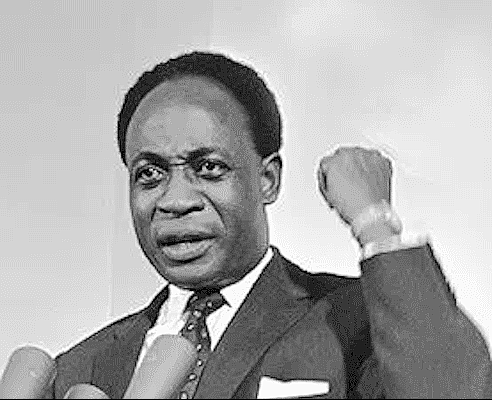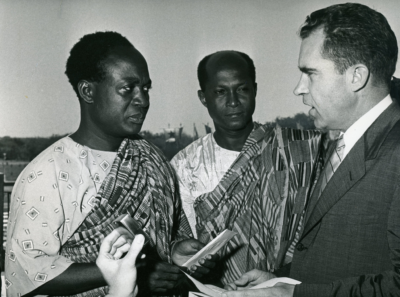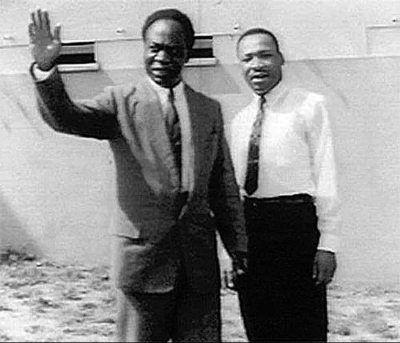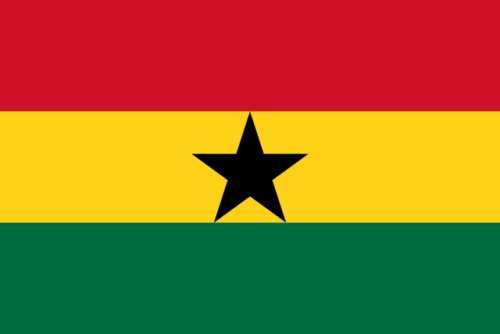The immediate post-independence era of Ghana in the late 1950s and early 1960s witnessed a unique experiment involving the migration of African Americans to the newly formed nation. This historic initiative, known as the “Back-to-Africa” movement, aimed to reconnect descendants of enslaved Africans with their ancestral homeland. This article explores the reasons behind the arrival of African Americans in Ghana, their roles and contributions, their relationship with the local population, the success or otherwise of the experiment, and notable individuals who participated.
The primary motivation behind the migration of African Americans to Ghana was to forge a connection with their African roots, seeking a sense of identity, cultural heritage, and belonging. Inspired by the ideals of Pan-Africanism and the charismatic leadership of Ghana’s first president, Dr. Kwame Nkrumah, many African Americans saw Ghana as a beacon of hope for the realization of a united African continent.

Dr. Nkrumah believed that Africa was the homeland of all Black people and that they had a common destiny and struggle against colonialism, racism, and exploitation. He also believed that Africa needed the skills, talents, and resources of its diaspora to achieve its full potential and independence. Therefore, he invited African Americans to come to Ghana as citizens, guests, advisers, teachers, artists, journalists, and more. He offered them land, passports, jobs, scholarships, and other incentives to encourage them to relocate or visit.
Another reason why African Americans were brought to Ghana was their own desire to reconnect with their ancestral roots and heritage. Many of them felt alienated and discriminated against in the United States, where they faced segregation, violence, poverty, and injustice. They also felt disillusioned with the civil rights movement, which they felt was not radical enough or effective enough in challenging the status quo. They saw Ghana as a land of opportunity and freedom, where they could rediscover their identity and culture, and participate in a historic project of nation-building and liberation.
Upon their arrival in Ghana, African Americans played diverse roles in the nation’s development. Many of them participated in the educational sector, sharing their knowledge and expertise to establish schools and educational programs. African American musicians, artists, and writers also made significant contributions to Ghana’s cultural scene. They infused their unique perspectives, experiences, and creative talents into Ghana’s arts, enriching the cultural landscape of the country. Their contributions helped promote cultural exchange, fostering a vibrant and diverse artistic environment. Additionally, African Americans were actively involved in political and social movements, supporting Ghana’s vision for self-determination and Pan-African unity. They worked alongside Ghanaians in various sectors, striving for social justice, economic development, and the eradication of vestiges of colonialism and colonial legacies.
The relationship between African Americans and the local population in Ghana was complex but generally positive. Ghanaians, influenced by the principles of Pan-Africanism, welcomed the African American migrants as long-lost brothers and sisters returning home. The shared history of slavery and racial oppression served as a unifying factor, fostering solidarity and empathy between the two communities.
While there were some challenges related to cultural differences, language barriers, and varying expectations, overall, the interactions were marked by mutual respect, collaboration, and a shared desire to build a prosperous Ghana. African Americans assimilated into Ghanaian society, learning local languages, participating in traditional ceremonies, and embracing Ghanaian customs.

The “Back-to-Africa” movement can be considered a partial success. It provided a transformative experience for many African Americans, allowing them to reconnect with their ancestral homeland, learn about their heritage, and rebuild their identities. Ghana, as the epicenter of this movement, benefited from the contributions of African Americans in various sectors, fostering cultural exchange and national development.
W.E.B. Du Bois, a prominent African-American civil rights activist, scholar, and writer, made a significant impact during his life and times in post-independence Ghana. After facing persecution and marginalization in the United States, Du Bois sought refuge in Ghana, where he continued his tireless pursuit of racial equality and Pan-African unity.
In 1961, at the age of 93, Du Bois settled in Ghana and became a citizen of the newly independent nation. Dr. Nkrumah welcomed him as a distinguished intellectual and invited him to contribute to the development of the country. Du Bois embraced his new life in Ghana with enthusiasm, actively participating in academia, politics, and cultural initiatives.
Du Bois accepted an appointment as a professor at the newly established University of Ghana, where he lectured on sociology, history, and Pan-African studies. The scholar’s presence at the university contributed to the development of Ghanaian students and influenced the direction of African scholarship.
The Encyclopedia Africana project founded by Du Bois was an ambitious undertaking aimed at documenting the contributions and history of Africans and people of African descent globally. Although incomplete at the time of his death, the project reflected his dedication to preserving African heritage and challenging the prevailing Eurocentric narratives.
Right up until his passing in 1963 at the age of 95, Du Bois left a lasting impact on the intellectual and political discourse of the country. The W.E.B Du Bois Memorial Centre for Pan-African Culture was dedicated on June 22, 1985 in Accra in his memory. The center contains the tombs of Du Bois and his dear wife, Shirley Graham Du Bois.
Maya Angelou, the renowned poet, writer, and civil rights activist, spent a significant portion of her life in post-independence Ghana, participating in the “Back to Africa” movement. Angelou’s decision to come to Ghana was driven by a desire to connect with her African roots and to contribute to the Pan-African movement. The creative’s time in Ghana profoundly influenced her life and writing, shaping her perspectives on identity, race, and social justice.
In the early 1960s, Angelou, like many African Americans, sought to reconnect with her African heritage and escape the racial injustices prevalent in the United States. Inspired by the Pan-African ideals of unity and liberation, Angelou decided to move to Ghana with her son, Guy, after spending two years in Cairo, Egypt. She was particularly drawn to Ghana’s reputation as a thriving center for African culture and political activism under the leadership of Dr. Nkrumah.
Angelou’s time in Ghana had a profound impact on her personal growth and writing. Working at the university and traveling through the villages in the eastern part of the country, allowed her to experience firsthand, the vibrant and diverse African cultures, traditions, and languages. It provided her with a new perspective on her African identity and a deeper understanding of the shared history and struggles of people of African descent. She lived in Ghana from 1962 to 1965 and her time there is captured in her book, All God’s Children Need Traveling Shoes.
George Padmore, born Malcolm Ivan Meredith Nurse, was a Trinidadian-born journalist, author, and leading Pan-African activist who became Dr. Nkrumah’s close adviser and friend. Padmore’s paternal great-grandfather was an Asante warrior who was captured and sold into slavery in Barbados. After studying in the U.S. and living in the Soviet Union, Germany, France, and England, Padmore finally settled in Ghana in his later years. He helped organize the All-African People’s Conference held in Accra in 1958, which brought together delegates from 28 independent African countries and 9 diaspora organizations to discuss issues such as decolonization. He is buried in the Christiansborg Castle in Accra, Ghana, and has a research library dedicated to his memory.
Malcolm X visited Ghana in May of 1964. Maya Angelou, author and novelist Julian Mayfield, and a few other African-Americans including Alice Windom, formed an organizing committee for Malcolm’s visit. He met with Dr. Nkrumah and other important Ghanaian leaders. Malcolm addressed the Ghanaian Press for over two hours answering a diverse range of questions. This was after the ruling Convention People’s Party officials had overcome their initial prejudices and hesitancy in allowing such a militant Black American activist a platform to voice his ideas.
The time of Malcolm X’s visit coincided with a critical period when Dr. Nkrumah was in negotiations with the U.S. government about funding for the Akosombo or Volta Dam. Already, Dr. Nkrumah’s socialist stance had angered the U.S. government and the party did not want to aggravate the situation any further. In addition, a number of white socialist European countries were helping with Ghana’s nascent economic development. The Ghanaian leaders did not want to jeopardize this given Malcolm’s attitude towards whites in general. Somehow, these hurdles were overcome and Malcolm, got to put his case for the Black American struggle for freedom and civil rights to a nation, that itself had recently freed her people from the yoke of colonialism.
Muhammad Ali visited Ghana in 1964 as a boxing champion and a Muslim convert. He was greeted by thousands of fans who chanted his name. Richard Wright was a novelist who visited Ghana in 1953. He wrote about his impressions of the country in his book Black Power. Pauli Murray was a lawyer and civil rights activist who came to Ghana in 1960. She built a Constitutional Law Course at the university and wrote about her experiences of racism and sexism in her book Proud Shoes.
Upon invitation by Dr. Nkrumah, Dr. Martin Luther King, Jr., and his wife Coretta Scott King traveled to Ghana to attend Ghana’s Independence ceremony on March 6, 1957. Dr. King identified with Ghana’s struggle; furthermore, he recognized a strong parallel between resistance against European colonialism in Africa and the struggle against racism in the United States.

On 4 March, Dr. King attended a reception where he met then U.S. Vice President Richard Nixon, who was also in Ghana for the celebrations. Dr. King told Nixon, “I want you to come visit us down in Alabama where we are seeking the same kind of freedom the Gold Coast is celebrating.” The next day, Dr. King attended the ceremonial closing of the old British Parliament. At the ceremony, the recently incarcerated Dr. Nkrumah and his ministers wore their prison caps, symbolizing their struggle to win Ghana’s freedom. Dr. King wrote: “When I looked out and saw the prime minister there with his prison cap on that night, that reminded me of the fact, that freedom never comes easy. It comes through hard labor and it comes through toil.”
At midnight on March 6, Dr. King attended the official ceremony in which the British Union Jack was lowered and the new flag of Ghana was raised and the British colony of the Gold Coast became the independent nation of Ghana. Dr. King later recalled, “As we walked out, we noticed all over the polo grounds almost a half a million people. They had waited for this hour and this moment for years.” Dr. King’s reaction to the Ghanaians’ triumph was outwardly emotional. “Before I knew it, I started weeping. I was crying for joy. And I knew about all of the struggles, and all of the pain, and all of the agony that these people had gone through for this moment.”
The “Back-to-Africa” experiment faced challenges in fully integrating African Americans into Ghanaian society due to the vast cultural differences and the need for social adaptation. Many African Americans eventually returned to the U.S. due to difficulties in adjusting to the new environment or disillusionment with the post-independence realities in Ghana.
Present day Ghana has become the destination of choice for diasporans looking for a spiritual home and an ancestral connection in Africa. Ghana, from whose shores the majority of 15 million Africans passed into slavery, has invited its descendants in the diaspora to return home. The country has had a long history, from the days of its first president, Dr. Nkrumah, of encouraging the return of persons of African descent to help with the continent’s development. Despite the initial setbacks, people of African descent continue to migrate to the continent, though sadly, not in the expected droves.
Edward Kusi is a lifelong student/teacher in this adventure called Life, who stands for the betterment of humanity. Edward lives in Accra, Ghana, and enjoys reading, writing, and researching.











